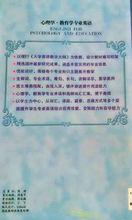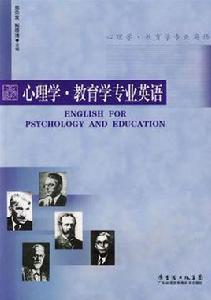圖書簡介
《心理學·教育學專業英語》主要特色:
1.編者用一種比較全面的語言觀研究大學專業英語教學,設計教材編寫框架,編寫本套教材。作者在編寫本套教材時借鑑、吸取、融合。並創造性地運用了國內外多種和語言學語言教學研究成果(特別是專門用途英語(ESP/EAP)的教學研究成果),努力做到把國 外先進實用的外語教學理論和方法,和我國長期以來所積累的行之有效的外語教學的經驗和方法,我國大學專業英語教學對象的英語現狀和要求,與《大綱(修訂本)》的具體規定和指標四者相結合。
2.以積累專業英語基礎知識和提高專業英語基本語言運用技能為目的,讓學生從辭彙、語段、篇章、思維方式等層面上學習和積累專業英語知識,全面訓練並提高專業英語綜合技能和交際能力。
3.全書選文均摘自國外近期出版的英文原版心理學、教育學教材和專著,從而使英語語言由淺入深,有系統性;使專業知識循序漸進,有連貫性;使專業英語語言的語料具有“原汁原味”的真實性。從多渠道多層面多角度向學生輸入大量可理解可接受的語言信息,促使學生積極思考。
 《心理學·教育學專業英語》圖片
《心理學·教育學專業英語》圖片4.每個單元圍繞一個專業知識主題,編選課文和設計思考題,便責學習者在大腦中反覆重現課文內容,鞏固和加深對課文的理解。另外,每篇課文開頭均以MainIdeaand.FocalPoints的形式對課文的主題和重點做了提示,能夠使學習者高效率地把握文章重點,起到事半功倍的作用。
5.大學專業英語是促進學生完成從學習過渡到實際套用的有效途徑,其主要目的是提高學生的英語套用能力。為此,教師在授課時可以提問學生課後精心設計的思考題,可以是口頭或筆頭回答,這對訓練和提高大學高年級學生的英語口頭輸出技能,筆頭輸出技能和流利程度極為有效。
6.對課文中生僻的單詞、專業術語以及較難理解的和較長的句子作了詳盡的注釋和翻譯,以方便學生在預習和自學中自己解決難點,儘可能地掃除閱讀障礙,減少學習難度,加快學習進度,提高學習興趣。
7.《心理學·教育學專業英語》第五部分收錄了心理學、教育學常用的專業術語和辭彙,便於學生集中學習和查閱,因此在一定程度上具有工具書的作用。
8.《心理學·教育學專業英語》的編寫思路是以學生為中心,以自主學習為主,讓學生課內和課外相結合,學習和套用相結合,訓練學生把基礎階段學到的語言知識和語言能力在所學專業領域中得到套用、鞏固、擴展和提高,促進學生完成從學習過渡到實際套用這一語言習得的過程,進一步幫助學生掌握良好的英語學習方法,打下紮實的專業英語知識基礎,具備較強的專業英語套用能力,使他們能用英語交流信息,更好地適應未來工作的需要和進一步提高自己的高級英語套用能力。
適用對象
本書可供心理學和教育學專業的高年級學生作為必修課教材使用;大專生和中專生也可藉助書中詳盡的注釋和翻譯進行自修;專業人員可選用本書作為專業英語教材,以提高自己的專業水平和技能;未學過專業英語的在校研究生可將該教材作為專業英語自學讀本,通過自學提高自己的專業英語套用能力。
圖書目錄
Unit 1 Skills of Reading
1. The Reading Process
2. The Reading Strategies
3. Vocabulary Building
4. Rapid Reading
Unit 2 Skills of Writing
I. Abstract Writing
2. Writing in Social Sciences
3. Writing in Natural Sciences
Unit 1 History of Psychology
1. Introduction of Psychology
2. Wilhelm Wundt's Psychology of Consciousness
3. Functionalism at the University of Chicago
Unit 2 General Psychology
1. Learning and Human Intelligence
2. Motivation and Emotion
Unit 3 Developmental Psychology
1. The Long-Term Influence of Prenatal Behaviour
2. Emotional and Social Development in Early Childhood
Unit 4 Cognitive Psychology
1. Introduction to Cognitive Psychology
2. Characterising Problem Solving
Unit 5 Personality Psychology
1. What ls Personality?
2. Personal Constructs
Unit 6 Social Psychology
1. Theories in Social Psychology
2. Self-Presentation
Unit 7 Abnormal Psychology
1. Introduction to Abnormal Psychology
2. Mood Disorders
Unit 8 Psychological Testing and Statistics
1. The Nature of Tests
2. Psychological Statistics
Unit 1 Theory of Education
1. Reform of Education
2. Quality Education
Unit 2 Educational Administration
1. A Century's Quest to Understand School Leadership
2. Introduction to the National Commission for Cooperative Education (NCCE)
Unit 3 Moral Education /264
1. Should Moral Educators Abandon Moral Relativism?
2. Schemas, Culture, and Moral Texts
Unit 4 Philosophy of Education
1. Pragmatism and Education Research
2. Postmodernism and Education !
Unit 5 Teacher Education
1. Developing an Understanding of Learning to Teach in Teacher Education
2. Professional Knowledge and the Teacher's Life and Work
Unit 6 Sociology of Education and Comparative Education
1. Research and Theory on Equality and Education
2. The Future of Comparative and International Educa'~on in a Globalised World
Unit 7 Education Law and Policy /355
1. Discipline and Exclusion from School
2. Standards for Conduct, Routine Procedures, and Safe-School Policies
Unit 8 Assessment, Teaching and Learning Strategies
1. Strategies for Motivating Students and Building Productive Learning Communities
2. Assessment, Learning Theories and Testing Systems
1. Correlational Designs
2. Methods of Contextual Assessment and Assessing Contextual Methods: A Developmental Systems
Perspective
Unit 1 Vocabulary of Psychology
Unit 2 Vocabulary of Education
Bibliography

